US Elections: Moscow favors former President Trump, but avoids risks that could lead to interference accusations

SUMMARY: Official Kremlin and pro-Kremlin likely inauthentic accounts on X post about US elections at high volumes and favor former President Trump over Vice President Harris. However, Moscow seeks to hide its influence.
- Inauthentic accounts promoted biased messaging more frequently and at higher volumes than official accounts, especially in their most recent campaigns in September.
- Inauthentic accounts minimized their footprint on the information environment by amplifying right-wing US voices rather than injecting their own narratives. This tactic is consistent with the US Justice Department’s finding from 4 September that Moscow covertly laundered its narratives through US influencers.
MOSCOW’S GOAL: Increase the odds of victory for Trump—who favors a quick settlement of the Ukraine war that may lock in Moscow’s territorial advances—while minimizing the chances that Moscow will face accusations of election interference.
MOSCOW’S VULNERABILITY: Moscow is likely sensitive to accusations that it interferes in elections, which can undermine Moscow’s global narrative that it is the US—not Russia—that interferes in other countries’ internal affairs.
- Revealing Moscow’s covert influence, as the US government did on multiple occasions in early September, imposes costs on Moscow by forcing official Kremlin accounts to issue a large official response to defend themselves.
- The inauthentic accounts’ risk-averse tactic of reposting right-wing accounts likely makes it near impossible for them to influence voters. Reposts of right-wing accounts may make the right-wing accounts seem slightly more popular—but those accounts have high levels of authentic engagement already, and seeing that a post has a few extra reposts will not change voters’ minds.
Snapshot: September election-related events caused spikes in official Kremlin messaging-but lower spikes than in July and compared to spikes from inauthentic accounts
The debate between Trump and Harris and the second assassination attempt on Trump led to large campaigns from official Kremlin accounts. However, these spikes were smaller than surges in messaging about election-related events in July.
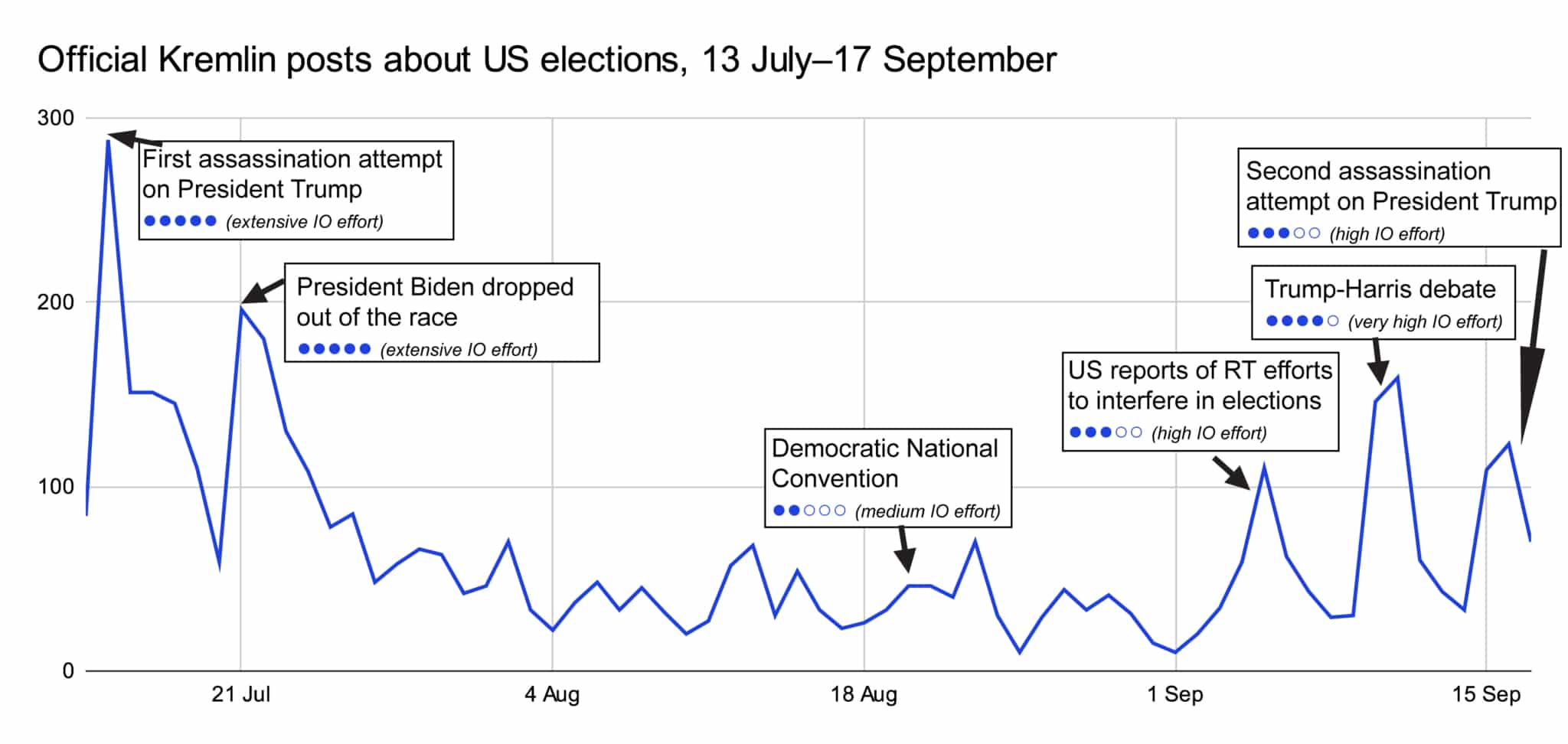
Figure 1
Pro-Kremlin, likely inauthentic accounts posted at even higher volumes about the debate and the second assassination attempt than official accounts did—both in absolute terms and relative to previous spikes. For example, inauthentic post volumes spiked higher for these September events than for President Biden’s decision to drop out of the race. We lack enough evidence at this time to determine whether these inauthentic accounts are controlled by Moscow. If they are, however, these trends could indicate that Moscow is increasingly hiding its election-related messaging behind inauthentic accounts in the election’s final stretch.
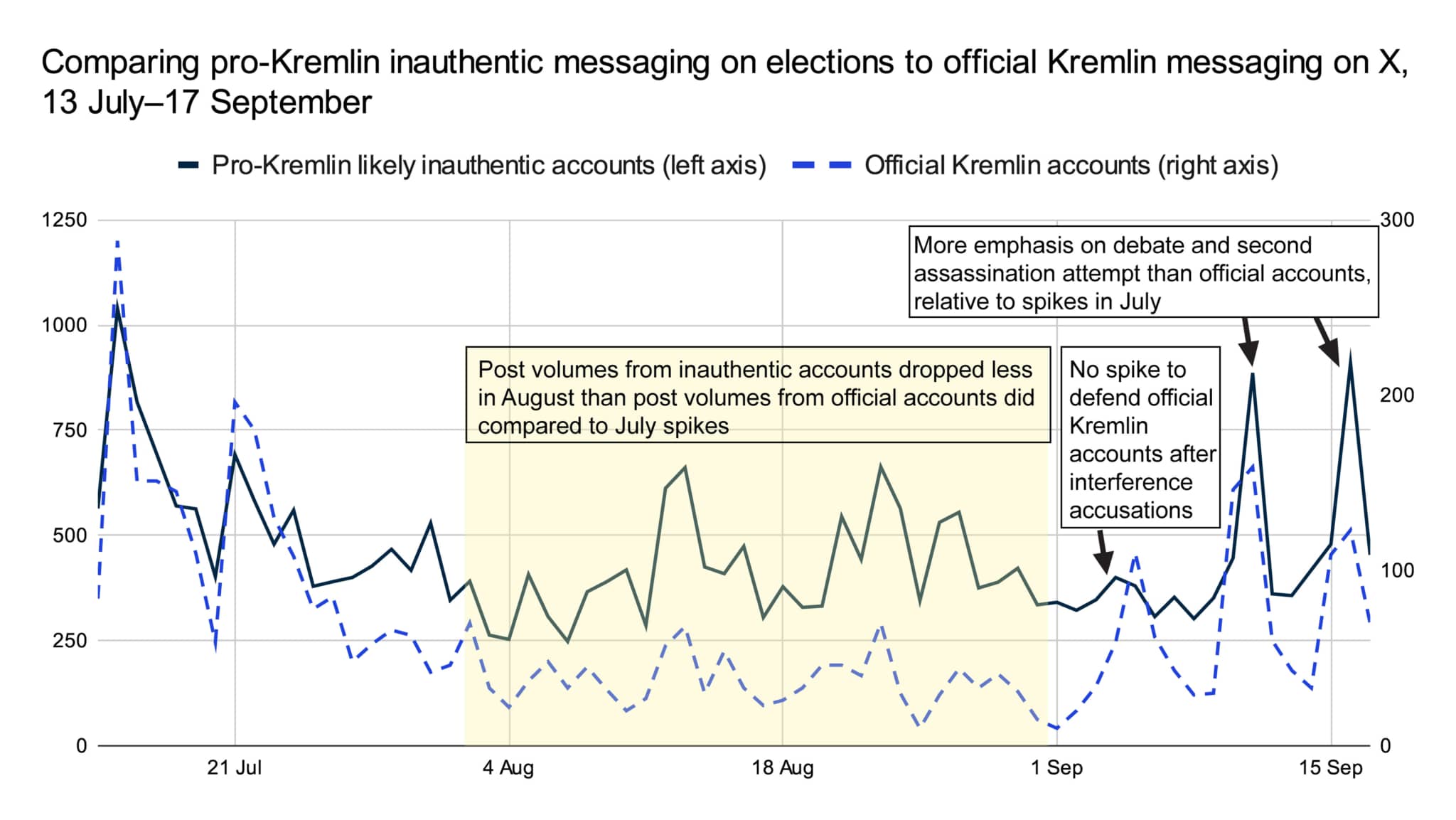
Figure 2
Narratives: Inauthentic accounts overwhelmingly favored Trump, but official Kremlin accounts kept most posts impartial
Both official Kremlin accounts and pro-Kremlin likely inauthentic accounts promoted narratives favorable to Trump. However, official accounts kept most of their messaging neutral in tone or promoted Russian interests without favoring either candidate, such as by criticizing US sanctions against the state media outlet RT for covert election influence efforts. By contrast, inauthentic accounts mostly favored Trump in posts about the election—particularly by promoting content that criticized Harris rather than content that praised Trump.
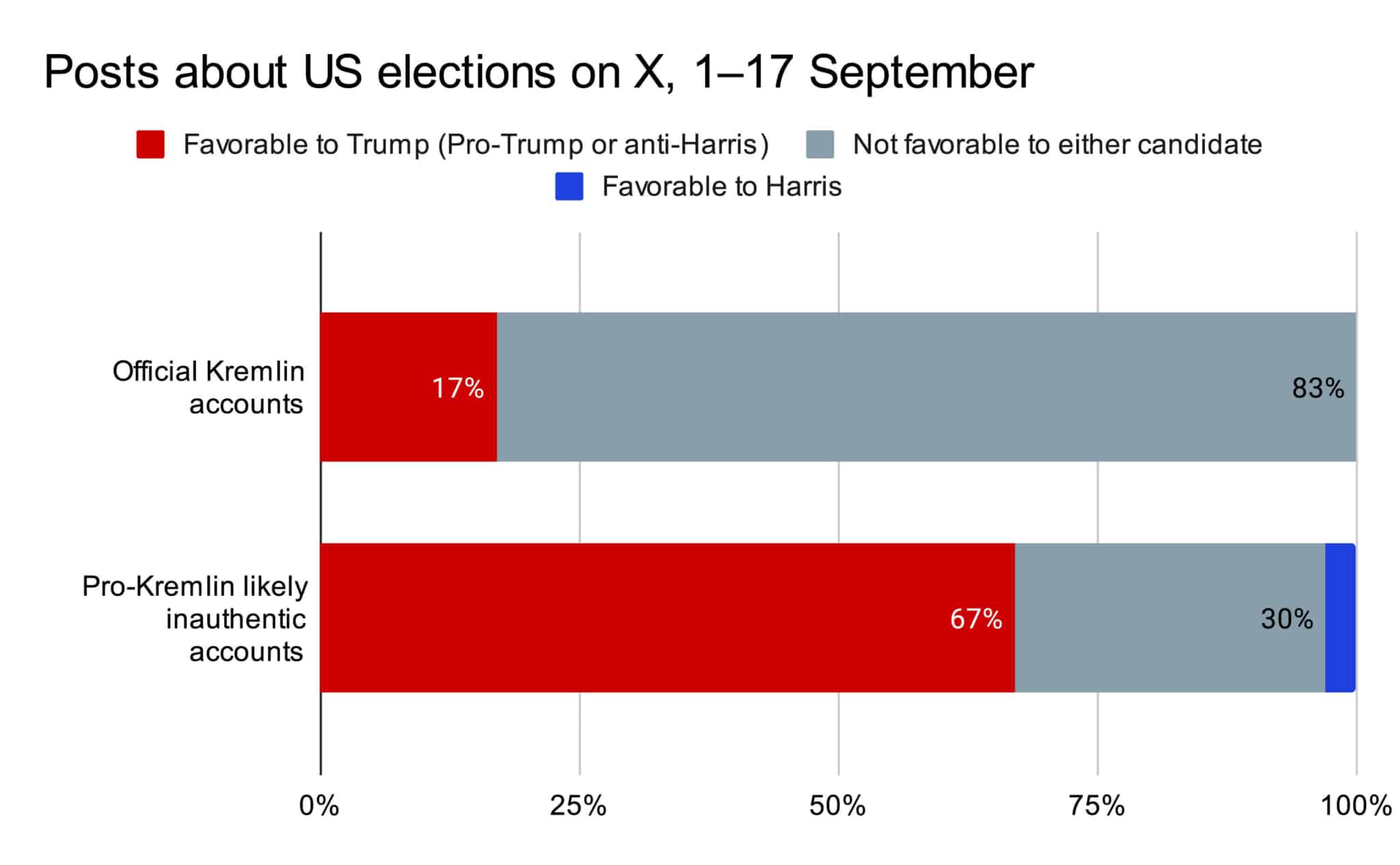
Figure 3
TTPs: The top tactic of inauthentic election-related messaging was reposting content from US right-wing influencers
Approximately 95% of the inauthentic posts we detected were reposts, not original posts or comments. Network analysis revealed that the pro-Kremlin inauthentic accounts typically shared posts from three kinds of accounts:
- Authentic accounts of US politicians, most prominently current and former candidates in the election. Content tagging Harris’ account nearly always features right-wing criticism of the vice president, such as reposts of negative comments on her posts.
- Right-wing influencer accounts, including authentic accounts of journalists and other media personalities, unofficial accounts supporting US politicians, and anonymous accounts.
- Pro-Russia accounts that share content related to a variety of topics, not just US politics. We found fewer accounts in this category than in the above categories.
- Official Kremlin accounts, such as RT, were not prominent sources for inauthentic accounts on US elections, even though inauthentic accounts frequently share content from official Kremlin accounts on other topics. The inauthentic accounts likely shared
election-related content from official Kremlin sources rarely to avoid tying Moscow directly to any election interference.
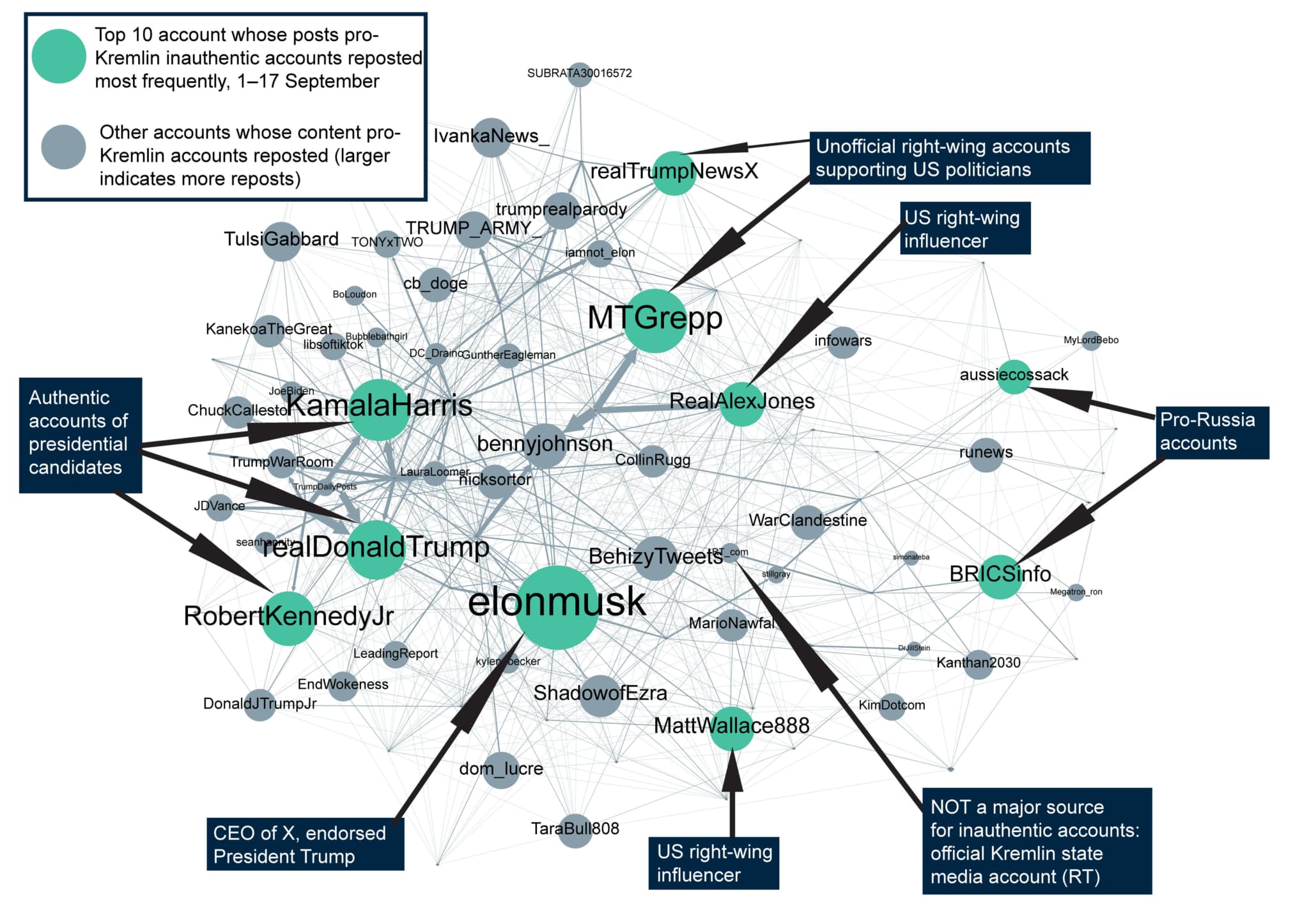
Definitions
M3 (Media Manipulation Monitor): A suite of products that offer data-driven analysis of Chinese and Russian media manipulation. For more information, please contact [email protected]
Propaganda or censorship event: A rise in post volume or a rise in censorship rate driven by the promotion or removal of content on a particular topic during a discrete time period.
Baselines and messaging levels: A baseline is the volume of posts or level of censorship that is typical for a news event. We define levels by standard deviations from baseline rates:
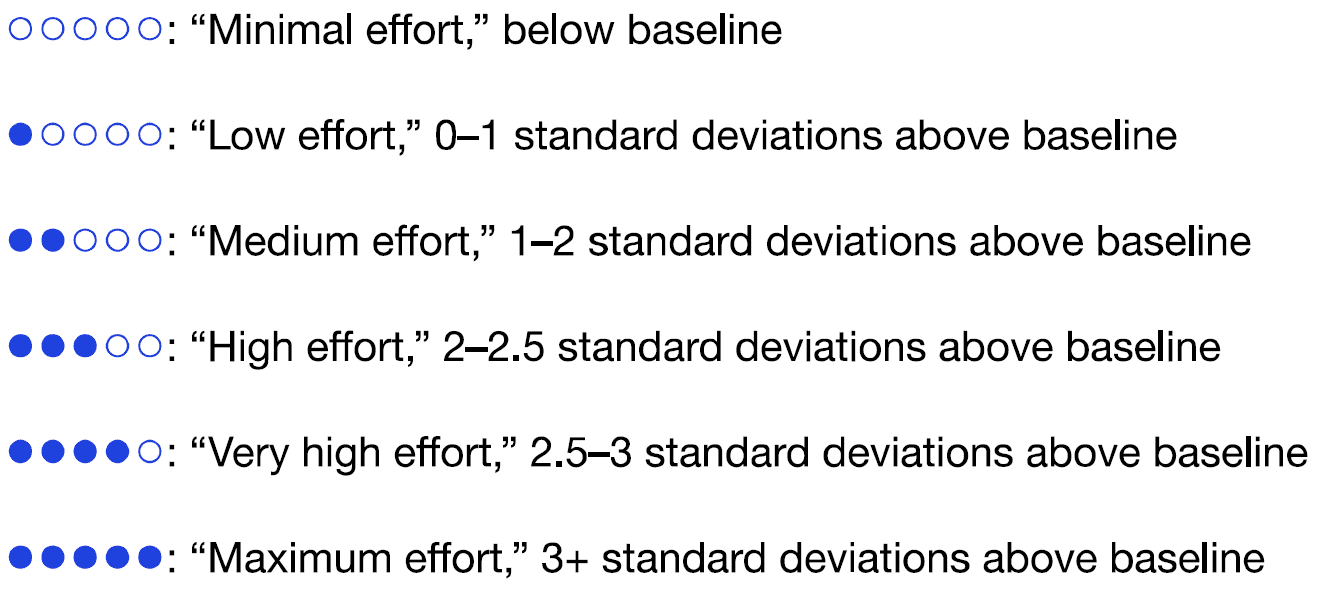
State-controlled accounts: We use “Kremlin accounts” or “PRC accounts” to refer to the social media accounts of official state media outlets, governmental organizations (such as embassies), and government officials.
Likely inauthentic accounts: When we say “likely inauthentic,” we mean that we assess the accounts are more-likely-than-not to be controlled or operated by an entity other than the users they present themselves to be. All of the inauthentic accounts that we track have a history of promoting pro-PRC or pro-Kremlin content. M3 does not attribute accounts or campaigns to Beijing or Moscow without additional evidence.






